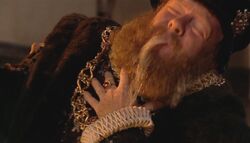
Witchcraft was the practice of magical arts. A practitioner of witchcraft was called a witch. In some cultures, the term "wizard" was used to refer to a male witch. (TV: The Dæmons)
Advanced science and technology, such as a DNA replication module, could be mistaken for witchcraft by those of less advanced cultures. The Carrionites used a word-based science that resembled witchcraft. (TV: The Shakespeare Code) Similarly, psychic powers could be mistaken for witchcraft, and individuals who possessed such abilities could be denounced as witches. (AUDIO: Winter for the Adept)
On Earth, followers of pre-Christian religions such as Neopaganism could be referred to as witches. Members of such religions, including the Witchkids, often rejected technology and gloried in superstition. (PROSE: Cat's Cradle: Warhead)
The Seventh Doctor was accused of witchcraft after his TARDIS materialised in a Haven marketplace. (PROSE: Companion Piece) The Spanish Inquisition similarly accused the human time traveller John Bentley of "witchcraft", branding him as a sorcerer, after his time machine's materialisation in the middle of a square in 1588 in broad daylight was witnessed. (COMIC: Dr. Who's Time Tales)
In an alternate timeline, Ruby Sunday described the fairy circles on clifftop in Wales as being like witchcraft, something which Enid Meadows took offense to. Members of UNIT were armed with necklaces of silver and salt in case of witchcraft. (TV: 73 Yards [+]Russell T Davies, Doctor Who series 14 (BBC One and Disney+, 2024).)